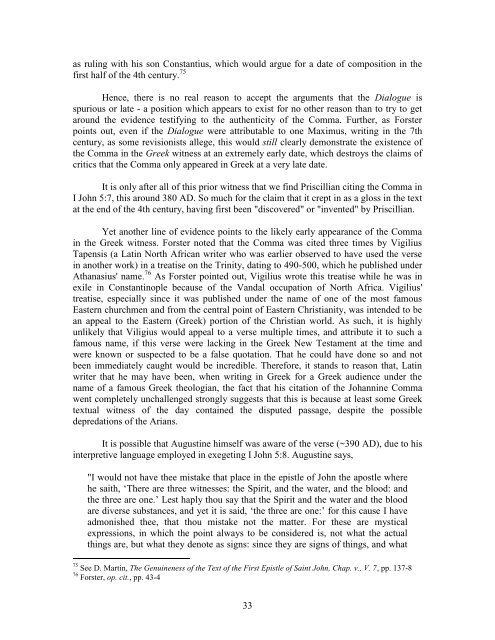A Defense of the Johannine Comma - Study to Answer.Net
A Defense of the Johannine Comma - Study to Answer.Net
A Defense of the Johannine Comma - Study to Answer.Net
You also want an ePaper? Increase the reach of your titles
YUMPU automatically turns print PDFs into web optimized ePapers that Google loves.
as ruling with his son Constantius, which would argue for a date <strong>of</strong> composition in <strong>the</strong><br />
first half <strong>of</strong> <strong>the</strong> 4th century. 75<br />
Hence, <strong>the</strong>re is no real reason <strong>to</strong> accept <strong>the</strong> arguments that <strong>the</strong> Dialogue is<br />
spurious or late - a position which appears <strong>to</strong> exist for no o<strong>the</strong>r reason than <strong>to</strong> try <strong>to</strong> get<br />
around <strong>the</strong> evidence testifying <strong>to</strong> <strong>the</strong> au<strong>the</strong>nticity <strong>of</strong> <strong>the</strong> <strong>Comma</strong>. Fur<strong>the</strong>r, as Forster<br />
points out, even if <strong>the</strong> Dialogue were attributable <strong>to</strong> one Maximus, writing in <strong>the</strong> 7th<br />
century, as some revisionists allege, this would still clearly demonstrate <strong>the</strong> existence <strong>of</strong><br />
<strong>the</strong> <strong>Comma</strong> in <strong>the</strong> Greek witness at an extremely early date, which destroys <strong>the</strong> claims <strong>of</strong><br />
critics that <strong>the</strong> <strong>Comma</strong> only appeared in Greek at a very late date.<br />
It is only after all <strong>of</strong> this prior witness that we find Priscillian citing <strong>the</strong> <strong>Comma</strong> in<br />
I John 5:7, this around 380 AD. So much for <strong>the</strong> claim that it crept in as a gloss in <strong>the</strong> text<br />
at <strong>the</strong> end <strong>of</strong> <strong>the</strong> 4th century, having first been "discovered" or "invented" by Priscillian.<br />
Yet ano<strong>the</strong>r line <strong>of</strong> evidence points <strong>to</strong> <strong>the</strong> likely early appearance <strong>of</strong> <strong>the</strong> <strong>Comma</strong><br />
in <strong>the</strong> Greek witness. Forster noted that <strong>the</strong> <strong>Comma</strong> was cited three times by Vigilius<br />
Tapensis (a Latin North African writer who was earlier observed <strong>to</strong> have used <strong>the</strong> verse<br />
in ano<strong>the</strong>r work) in a treatise on <strong>the</strong> Trinity, dating <strong>to</strong> 490-500, which he published under<br />
Athanasius' name. 76 As Forster pointed out, Vigilius wrote this treatise while he was in<br />
exile in Constantinople because <strong>of</strong> <strong>the</strong> Vandal occupation <strong>of</strong> North Africa. Vigilius'<br />
treatise, especially since it was published under <strong>the</strong> name <strong>of</strong> one <strong>of</strong> <strong>the</strong> most famous<br />
Eastern churchmen and from <strong>the</strong> central point <strong>of</strong> Eastern Christianity, was intended <strong>to</strong> be<br />
an appeal <strong>to</strong> <strong>the</strong> Eastern (Greek) portion <strong>of</strong> <strong>the</strong> Christian world. As such, it is highly<br />
unlikely that Viligius would appeal <strong>to</strong> a verse multiple times, and attribute it <strong>to</strong> such a<br />
famous name, if this verse were lacking in <strong>the</strong> Greek New Testament at <strong>the</strong> time and<br />
were known or suspected <strong>to</strong> be a false quotation. That he could have done so and not<br />
been immediately caught would be incredible. Therefore, it stands <strong>to</strong> reason that, Latin<br />
writer that he may have been, when writing in Greek for a Greek audience under <strong>the</strong><br />
name <strong>of</strong> a famous Greek <strong>the</strong>ologian, <strong>the</strong> fact that his citation <strong>of</strong> <strong>the</strong> <strong>Johannine</strong> <strong>Comma</strong><br />
went completely unchallenged strongly suggests that this is because at least some Greek<br />
textual witness <strong>of</strong> <strong>the</strong> day contained <strong>the</strong> disputed passage, despite <strong>the</strong> possible<br />
depredations <strong>of</strong> <strong>the</strong> Arians.<br />
It is possible that Augustine himself was aware <strong>of</strong> <strong>the</strong> verse (~390 AD), due <strong>to</strong> his<br />
interpretive language employed in exegeting I John 5:8. Augustine says,<br />
"I would not have <strong>the</strong>e mistake that place in <strong>the</strong> epistle <strong>of</strong> John <strong>the</strong> apostle where<br />
he saith, ‘There are three witnesses: <strong>the</strong> Spirit, and <strong>the</strong> water, and <strong>the</strong> blood: and<br />
<strong>the</strong> three are one.’ Lest haply thou say that <strong>the</strong> Spirit and <strong>the</strong> water and <strong>the</strong> blood<br />
are diverse substances, and yet it is said, ‘<strong>the</strong> three are one:’ for this cause I have<br />
admonished <strong>the</strong>e, that thou mistake not <strong>the</strong> matter. For <strong>the</strong>se are mystical<br />
expressions, in which <strong>the</strong> point always <strong>to</strong> be considered is, not what <strong>the</strong> actual<br />
things are, but what <strong>the</strong>y denote as signs: since <strong>the</strong>y are signs <strong>of</strong> things, and what<br />
75 See D. Martin, The Genuineness <strong>of</strong> <strong>the</strong> Text <strong>of</strong> <strong>the</strong> First Epistle <strong>of</strong> Saint John, Chap. v., V. 7, pp. 137-8<br />
76 Forster, op. cit., pp. 43-4<br />
33


